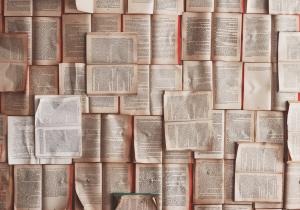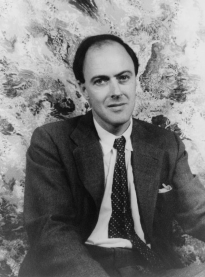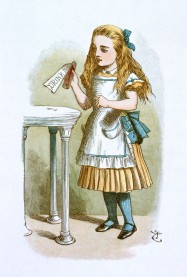To help everyone join in the celebration, we've compiled a range of fantastic quizzes, courses and even some eBooks for you to get stuck in to. Choose from the tiles of resources below and discover even more about your favourite authors and books.
Explore more on World Book Day
-
Exploring books for children: words and pictures
Learn more to access more details of Exploring books for children: words and picturesMany people have fond memories of the stories they encountered in childhood, perhaps especially of those wonderful picture books and illustrated tales which fired our young imaginations and transported us to magical worlds. To an adult’s eye, some picture books may seem remarkably simple, even oversimplified. However, in this free course, ...

Free course
8 hours
Level: 2 Intermediate
-
Literacy and Social Justice Hub
Learn more to access more details of Literacy and Social Justice HubWelcome! Delve through a range of resources to support you in widening your knowledge and understanding of literacy, language, literature and social justice.

Collection
-
Harry Potter and the Translator’s Challenge
Read now to access more details of Harry Potter and the Translator’s ChallengeHow did translators go about converting the anagram 'Tom Marvolo Riddle'? Fernando Rosell-Aguilar explores the tricky business of translating J.K. Rowling's fun and creative words into 80 other languages.

Article
Level: 1 Introductory
-
Encouraging book talk in the school library
Learn more to access more details of Encouraging book talk in the school libraryAs adults we sometimes struggle to justify our feelings about particular books, but children are quite clear about what they like and don't like. It is possible to get children to discuss why they liked or did not like particular books and to encourage them to think more deeply about the books they've read. This free course, Encouraging book ...

Free course
4 hours
Level: 1 Introductory
-
The man behind Matilda – what Roald Dahl was really like
Read now to access more details of The man behind Matilda – what Roald Dahl was really likeRoald Dahl: the incredible storyteller loved by millions or a belittling bully? Find out what his character was like in this article.

Article
Level: 1 Introductory
-
Mary Shelley: the expert view
Read now to access more details of Mary Shelley: the expert viewStephanie Forward outlines the life and legacy of the author of 'Frankenstein', Mary Shelley.

Article
Level: 1 Introductory
-
Quiz: Which Brontë sister wrote it?
Take part now to access more details of Quiz: Which Brontë sister wrote it?Charlotte, Emily and Anne Brontë had very different writing styles but can you tell their writing apart from the other?

Activity
Level: 1 Introductory
-
Exploring Virginia Woolf’s Between the Acts
Learn more to access more details of Exploring Virginia Woolf’s Between the ActsThis free course introduces Virginia Woolf’s last novel, Between the Acts (1941), with the aim of understanding how she writes about time, memory, and ideas about identity. It also considers why Woolf’s fiction is often considered difficult. Selected extracts from her essays on writing help to clarify some of these perceived difficulties, ...

Free course
6 hours
Level: 2 Intermediate
-
Download free eBook guides to famous literary works
Take part now to access more details of Download free eBook guides to famous literary worksExclusive to OpenLearn, OU experts have created guides to introduce some key works of fiction for you to download and read on your prefered device.

Activity
-
How does JK Rowling use Latin and other classical languages in Harry Potter?
Read now to access more details of How does JK Rowling use Latin and other classical languages in Harry Potter?To create a sense of the long history of wizardry in the Potterverse, JK Rowling drew heavily on classical languages. The OU's Joanna Paul explores.

Article
Level: 1 Introductory
-
Understanding Alice
Read now to access more details of Understanding AliceProfessor Kimberley Reynolds explores how Lewis Carroll transformed logic, literary traditions and ideas about childhood into the superbly inventive and irreverent Alice's Adventures in Wonderland.

Article
-
Approaching literature: reading Great Expectations
Learn more to access more details of Approaching literature: reading Great ExpectationsThis free course, Approaching literature: reading Great Expectations, considers some of the different ways of reading Great Expectations, based on the type of genre the book belongs to. This is one of the most familiar and fundamental ways of approaching literary texts. The novel broadens the scope of study of a realist novel, in both literary ...

Free course
15 hours
Level: 2 Intermediate
-
‘Literary Caregiving’: The War Library and Endell Street Military Hospital Library
Read now to access more details of ‘Literary Caregiving’: The War Library and Endell Street Military Hospital LibraryHow did women (including suffragettes) help wounded soldiers in the First World War? Dr Sara Haslam explores this question, drawing on her research into the War Library and the library at Endell Street Military Hospital.

Article
Level: 1 Introductory
-
Exploring children's difficulties with language and literacy
Listen now to access more details of Exploring children's difficulties with language and literacyWhat happens if children aren’t making progress with language and literacy, and what sort of learning impairments might be the cause? How can the study of children’s thinking help us to understand these learning difficulties? This album offers insights into some of the problems faced by children with the developmental disorders dyslexia, poor ...

Audio
-
How can digital books support children’s learning?
Read now to access more details of How can digital books support children’s learning?E-books and interactive apps can ensure that all children expand their reading range but they must be high quality. Professor Natalia Kucirkova explains more...

Article
Level: 1 Introductory

Rate and Review
Rate this article
Review this article
Log into OpenLearn to leave reviews and join in the conversation.
Article reviews